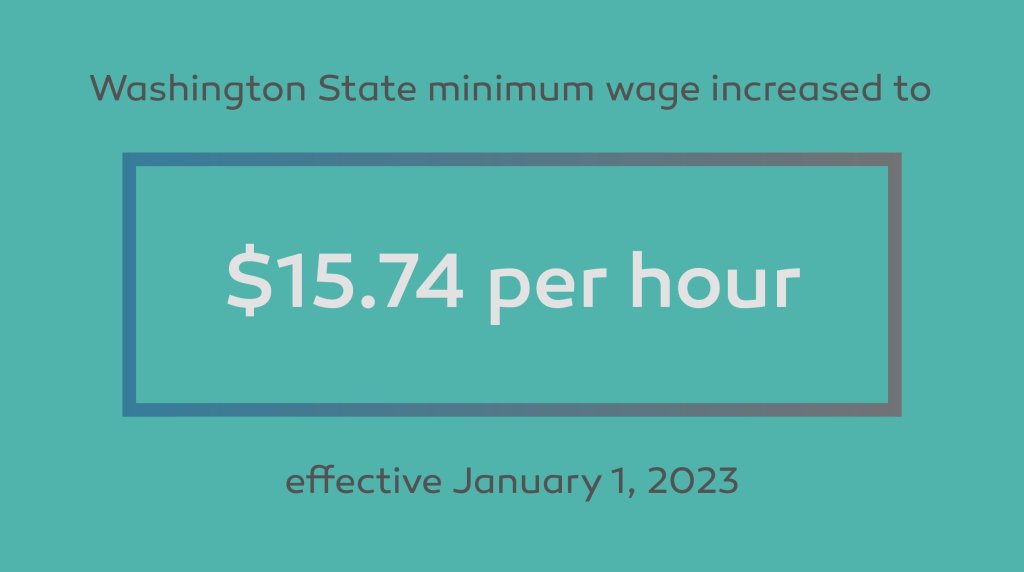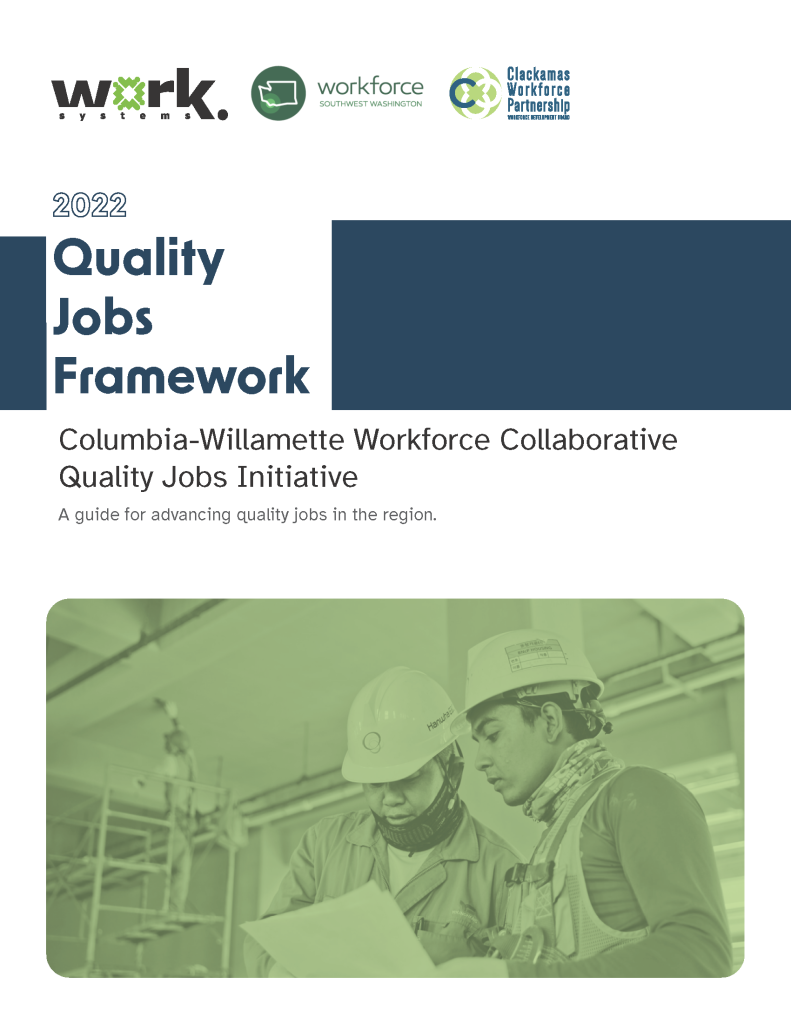In January 2023, Washington State ushered in two new regulations around wages – to raise the minimum wage and mandate wage transparency on job postings. The new regulations help job seekers and businesses alike, promoting self-sufficiency wages, wage transparency and increased job quality across the region.
Effective January 1, 2023, Washington State established $15.74 as the new minimum wage, up from $14.19 in 2022. The new wage regulations position Washington as the state with the highest minimum wage in the United States. Washington’s neighboring states, Oregon and Idaho trail behind with minimum wages of $13.50 and $7.25, respectively.
In January 2023, Washington State ushered in two new regulations around wages – to raise the minimum wage and mandate wage transparency on job postings. The new regulations help job seekers and businesses alike, promoting self-sufficiency wages, wage transparency and increased job quality across the region.
Effective January 1, 2023, Washington State established $15.74 as the new minimum wage, up from $14.19 in 2022. The new wage regulations position Washington as the state with the highest minimum wage in the United States. Washington’s neighboring states, Oregon and Idaho trail behind with minimum wages of $13.50 and $7.25, respectively.
According to the Massachusetts Institute of Technology (MIT) living wage calculator, the new minimum wage in Washington keeps up with the living wage standards in two of the three counties served by Workforce Southwest Washington. In Clark County, the living wage is $19.42, significantly higher than the newly established minimum wage. As of 2021, workers in Clark County made on average $32.22 per hour ($67,016 annually) in a stable job.

Both Cowlitz and Wahkiakum counties have living wage standards below Washington’s new minimum wage, with $15.28 and $14.05, respectively. In Cowlitz County, the average worker makes $29.91 per hour ($62,215 annually) and in Wahkiakum, $22.03 per hour ($45,823 annually) in a stable job. Although the minimum wage is enough to support oneself in the more sparsely populated counties in Washington State, the wage falls behind in more densely populated areas, such as Clark County and the Puget Sound area.
The Equal Pay and Opportunities Act, which took effect on January 1, 2023 requires businesses to disclose salary range and a general description of the benefits and other compensation on job postings.
For job applicants, the Equal Pay and Opportunities Act provides privacy of wage or salary history when applying for a job, and access to minimum wage or salary information of a new position, upon request by the applicant.
For employers, the act provides several benefits, including more potential candidates that are aligned with the offered salary, reduced turnover due to clearly communicated compensation and increased wage equity for populations that have traditionally experienced wage disparities. Employers that wish to go beyond the requirements of the law and provide comprehensive salary and benefits information on their job postings will position themselves as leaders in regional job quality.
How Workforce Southwest Washington has improved job quality through self-sufficiency wages
In 2021, WSW conducted a salary audit using the Nonprofit Salary Survey, which shows the competitive pay for nonprofits by region. With cost of living increasing significantly during COVID, WSW wanted to ensure staff were paid self-sufficient wages. In 2022, WSW leadership adjusted employee salaries to align with the pay of other nonprofits in Southwest Washington. WSW conducts the salary survey every two years. Salaries are reviewed annually and adjusted based on regional cost of living.
Offering competitive wages and providing wage transparency acts as a two-pronged retention strategy. Employees are offered compensation that provides self-sufficiency and are empowered to understand the opportunities for growth in their role and in the company.
WSW also made edits to its career webpage and job descriptions to accurately and comprehensively describe benefits as a strategy to recruit top talent.
 In 2022, Workforce Southwest Washington launched the Quality Jobs Framework in partnership with the Clackamas Workforce Partnership and Worksystems. The Framework aims to help businesses to improve job quality and jobseekers to identify quality jobs across the Portland-Southwest Washington region. Providing self-sufficiency wages is a key standard in the Framework. For individuals, working for a living wage sets them and their family up for financial success. For employers, offering a living wage can decrease the cost of turnover.
In 2022, Workforce Southwest Washington launched the Quality Jobs Framework in partnership with the Clackamas Workforce Partnership and Worksystems. The Framework aims to help businesses to improve job quality and jobseekers to identify quality jobs across the Portland-Southwest Washington region. Providing self-sufficiency wages is a key standard in the Framework. For individuals, working for a living wage sets them and their family up for financial success. For employers, offering a living wage can decrease the cost of turnover.
The Framework also outlines the standard of providing comprehensive benefits. The total compensation an employee receives is more than just a wage. For small businesses and nonprofits who are unable to pay a self-sufficiency wage above minimum wage, a comprehensive and clearly communicated benefit package helps increase the job quality and attract more qualified candidates.
The Quality Jobs Framework outlines several strategies for businesses looking to improve their benefits package. One strategy is to extend benefits to all workers, including frontline staff and lowest paid workers. Employers can cover the full medical insurance premiums, provide increased paid time off, bonuses, paid parking, profit-sharing, or other benefits usually only provided to higher ranking employees to all employees. Extending these benefits to all types of employees can help recruitment, retention and overall stability of an employer’s workforce.
Businesses should look at total compensation with a holistic approach, providing benefits that bolster their employees’ wages. Benefits for employees can include subsidized or covered transportation costs, healthcare, retirement match, comprehensive PTO and sick time, Employee Assistance Programs and childcare subsidies and/or waivers. Employers can also provide details about healthcare plans provided and how the company covers those benefits.
Workforce Southwest Washington’s business services team can help your company perform a competitive salary analysis based on region, industry and position. For information on providing comprehensive benefits, the Quality Jobs Guide on Comprehensive Benefits covers strategies on how employers can improve their benefits package. Workforce Southwest Washington’s business team can also assist with composing information on benefits for job descriptions. Please fill out the business request form and our team will get in touch!



